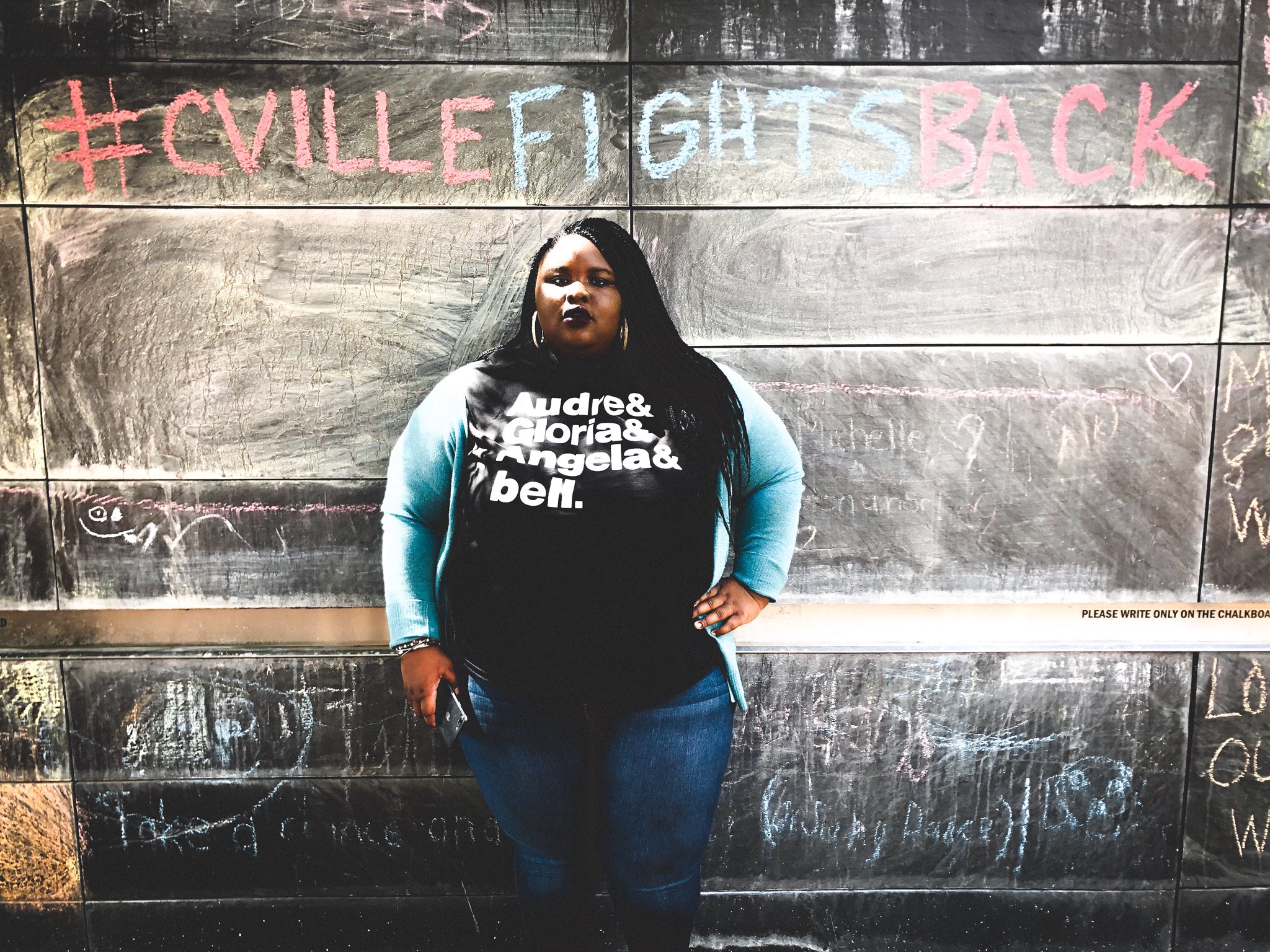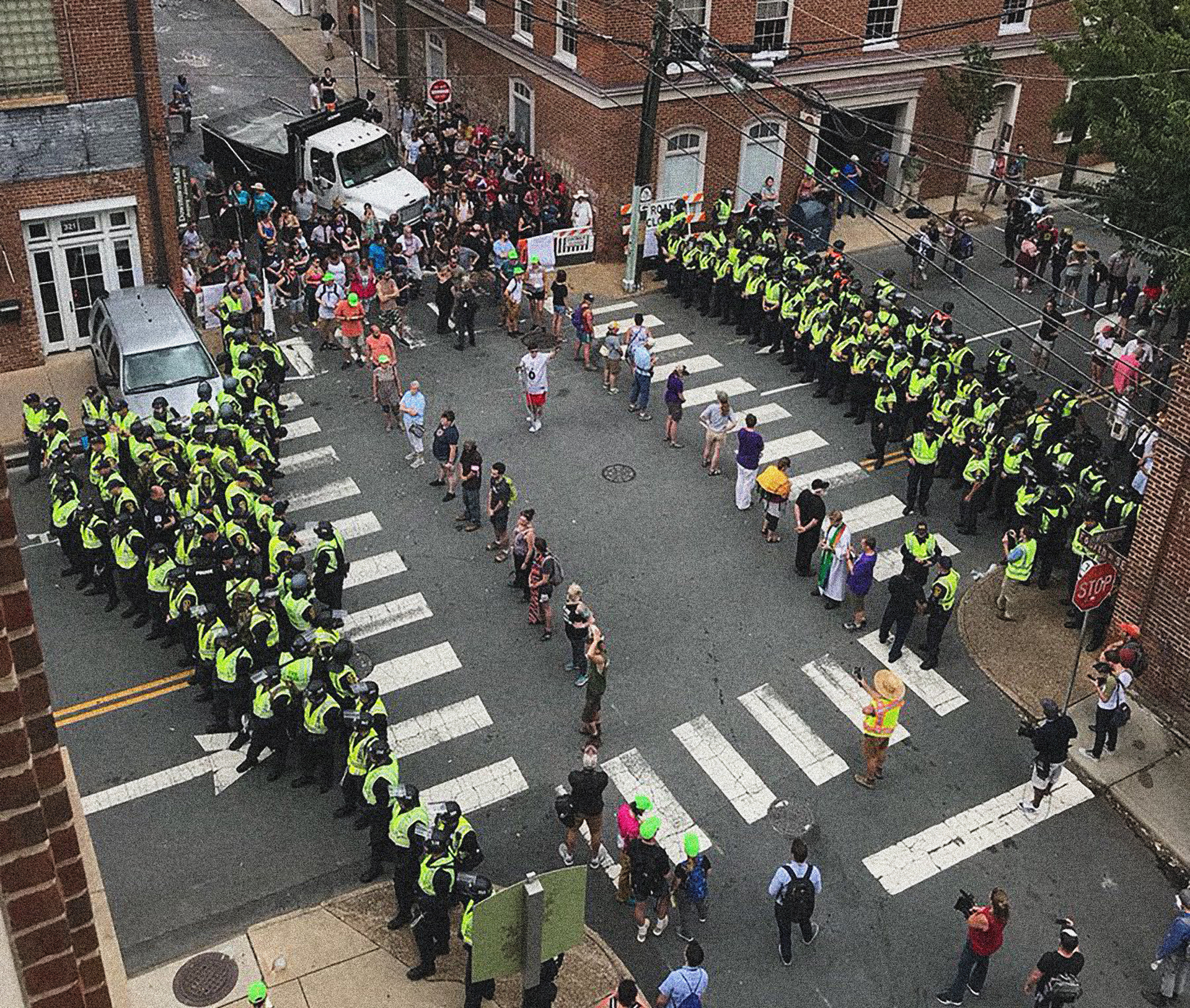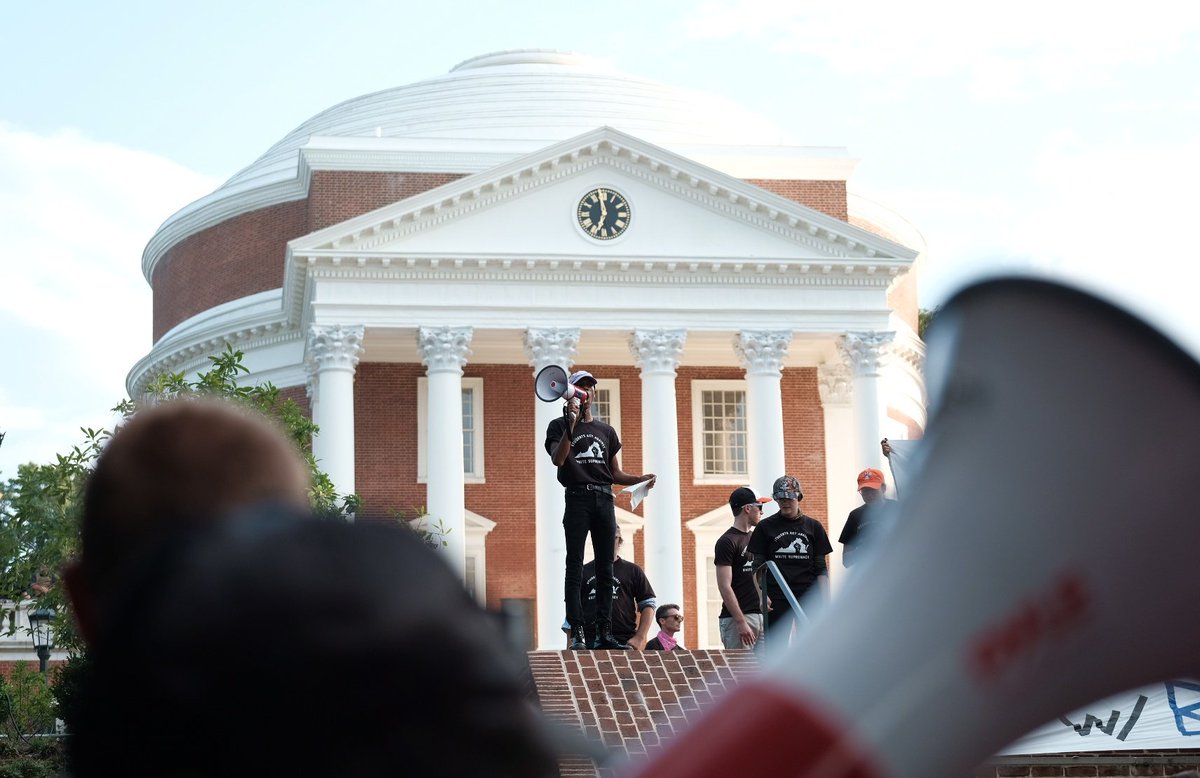One year after the white supremacist attacks on Charlottesville, Virginia, anti-racist students, clergy, and community members will come together in a wide range of events for healing, repair, and to continue to confront all forms of white supremacy. Below, we share comments from individual anti-racist activists in Charlottesville. Please contact us if you would like to speak with any of these individuals directly.
Zyahna Bryant
“A very long and deep history of white supremacy lurks beneath the perfectly painted illusion of Charlottesville. It’s alive in American policies, active in its courts, and taught in our classrooms. White supremacy and racism didn’t just arrive in Charlottesville on August 12th, 2017, it has always been here, and it has always been bigger than just a statue. Moving forward, we must stop erasing the names of women of color who built this movement from the ground up. Say the names of Sage Smith, Faye Tinsley, every victim of August 12th, and every other person who has been a victim of racial terror in this city.” — Zyahna Bryant, activist who initiated the petition to remove the Robert E. Lee statue and rename Lee Park
Brenda Brown-Grooms
“In America, the need to fight against white supremacy is everywhere apparent and everywhere necessary. White supremacy has infected every aspect of our mental, emotional, and physical lives. It is white supremacy which renders the faith practices of many as abominations, skewing their moral decisions. It is white supremacy which leads to the practice of weaponizing policing and pushing people of color into mass incarceration and the school-to-prison pipeline. We must face the lies inherent in white supremacy, and we must build our faith, our morality, and our country on something much stronger.” — Reverend Brenda Brown-Grooms, Pastor at New Beginnings Christian Community and organizer with Congregate Charlottesville
Rosia Parker
“I’m here embracing my blackness as A Black Queen resisting, persisting, and preserving life. I’m fighting for justice for my ancestors before me, and leaving a legacy for future generations after me.” — Rosia Parker, organizer with Black Lives Matter Charlottesville and member of the Civilian Review Board of the Charlottesville Police Department
Katrina Turner
“I’m fighting white supremacy because of the centuries of injustice against black and brown people. I’m fighting white supremacy in hopes that by the time my grandsons grow up, they won’t have to continue my fight. I’m fighting white supremacy because my ancestors did the same for me — without their fight I may have never been born. I go to meetings to organize. I go to court in support of people who have been wronged by the system. I’m fighting white supremacy so we as black and brown citizens can be treated with dignity and respect.” — Katrina Turner, organizer with Black Lives Matter Charlottesville, member of the Civilian Review Board of the Charlottesville Police Department and the People’s Coalition
Tanesha Hudson
“As we continue the fight against white supremacy in Charlottesville, my message to the world is that Black and Brown people live just like everybody else. We go to work, take care of our families, and we have our legacies that can’t be broken. I’m making a documentary to teach the world that Black people prosper even though slavery, Jim Crow & mass incarceration were designed to destroy us. Black People understand our history matters along with our lives.” — Tanesha Hudson, Executive Producer of forthcoming documentary A Legacy Unbroken: The Story of Black Charlottesville
Leslie Scott-Jones
“Long before the Summer of Hate I had been posing the question through art, specifically theater, ‘What happened to the Civil Rights Movement?’ Where did the momentum go? Who picked up the fight after MLK’s assassination? Is it one person or is it a group? When Black Lives Matter organized in Charlottesville, I got my answer, the same answer we have always gotten. I am still resisting through art, I have simply been more educated and focused. This is a marathon I run for the betterment of Black people.”— Leslie Scott-Jones, organizer with Black Lives Matter Charlottesville and the Charlottesville Players Guild
Esi Yarney
“I’m fighting white supremacy in Charlottesville because I’m tired of living in racially disparate communities. My parents, emigrants from Ghana, West Africa, taught me to fight white supremacy by pursuing education and serving my community. I was born and raised here, got a UVA undergraduate degree and a Master of Social Work from VCU. I’ve worked in the governor’s office, for the state, in University settings, in homeless services, and in low-income black neighborhoods. White America, you should learn how white privilege keeps you from seeing that white supremacy and racism are killing America as a whole, ask yourself why there are only 0-2 black people in any room you’re in, and then realize that these problems persist because of your lack of care and effort.” — B. Esi Yarney, organizer with Black Lives Matter Charlottesville
Cherry Henley
“As I look back on my life as an ex-offender, I am appalled that l was punished so severely for such a small act. Working in the criminal justice field, I see racism at its core. Our black men have been used in the criminal system as in slavery; used for profit while breaking their spirits and destroying the family structure. Black people are repeatedly targeted by stop-and-frisk and arrests in Charlottesville, most on petty crimes. Ex-offenders are blocked from access to housing or well-paying jobs. Our Black community is criminalized while white supremacists attack us with few legal consequences.” — Cherry Henley, Director of Lending Hands Ex-Offender Resource Network
Tim Porter
“As a father in this community, I’m concerned for the safety of this city’s minority members. Charlottesville has a problem with racial injustice, and to fight racial injustice we have to face white supremacy. We have to wake up and realize exactly what’s going on in our community, if we are ever going to change the narrative on race here in Charlottesville.” — Tim Porter, organizer with Black Lives Matter Charlottesville
Don Gathers
“I’m fighting against White Supremacy because I’m fearful of the world that my three sons have to live in. Vicious racism permeates our society, there are vicious people who will stop at nothing to push forward their agenda of hate, so we who think and live differently must be equally determined in our efforts. I’m pushing back through spiritual love and peace, with the word and the powerfully determined spirit God has placed in me, making others aware that this battle is so very vital to the ending of oppression and the continued survival of us all.” — Don Gathers, organizer with Black Lives Matter Charlottesville and a Deacon at First Baptist Church
Dr. Lisa Woolfork
“All forms of white supremacy must be resisted: in our courts, police, city council, city planning, all aspects of life. White supremacy is a danger to the health of our community. Even as institutions such the courts and police find themselves co-opted by white supremacy, so too are civic virtues such as “civility” and “politeness” routinely deployed to conceal hatred, bigotry, and fascism. In Charlottesville, we are mobilizing to resist white supremacy by refusing the lie of civility and choosing justice instead.”— Dr. Lisa Woolfork, organizer with Black Lives Matter Charlottesville
Dr. Andrea Douglas
“Charlottesville —and the nation— need to understand how the violent white supremacist rallies of last summer fit into a long legacy of racial terror. On the cusp of the anniversary of the white supremacist attacks last August, the 100 delegates on the Charlottesville Civil Rights Pilgrimage have returned ready to sow this truth throughout our community. People cannot arrive at empathy or understanding if they do not share the same undeniable truths about what has happened right here, in the present and in the past.” — Dr. Andrea Douglas, Executive Director of the Jefferson School African American Heritage Center, and co-organizer of the Charlottesville Civil Rights Pilgrimage
Dr. Jalane Schmidt
“Charlottesville’s history shows us that violent white mobs must be confronted: from the 1898 racial terror lynching of John Henry James, to the 1920s Klan support of the Confederate statues, to the white supremacist attacks last summer. We can’t ignore them, or they grow, they metastasize. Together, we can confront both this legacy of racial terror and the fascism brewing today.” — Dr. Jalane Schmidt, organizer with Black Lives Matter Charlottesville, and co-organizer of the Charlottesville Civil Rights Pilgrimage
Harold Foley
“I have seen injustice in all our social systems, and I want people to organize and strategize to make our communities better. We have power together, and we can fight white supremacy and achieve concrete wins for racial justice.” — Harold Foley, Community Organizer at the Legal Aid Justice Center
Andrea Negrete
“The Charlottesville jail is helping ICE detain and deport our community members. The city and county voluntarily collaborate with ICE because of the long legacy of white supremacy in Charlottesville where those in positions of power use local institutions as a tool for social control and to enact violence against black and brown community members. I’m resisting white supremacy in Charlottesville because I want to live in a world with no borders and no prisons.” — Andrea Negrete, organizer with UVA Graduate Student Coalition for Liberation and DREAMers on Grounds
Ibby Han
“On August 11th last year, I watched hundreds of torch-wielding Nazis invade the very same Lawn that I had walked down for graduation, just a few months prior. The white supremacists engulfed the few of us who had shown up to say no to fascism. The University of Virginia administration’s inaction that night emboldened white supremacists to be even more violent the next day, on August 12. No number of “healing vigils” or “unity concerts” can ever rectify what happened that night on UVA’s campus. We need real action from the administration: they must ban ALL identified white supremacists from the torch rally, they must pay for ALL the medical bills of survivors of the attack, and they must strongly condemn and vow to combat white supremacy in all its forms.” — Ibby Han, Director of Virginia Student Power Network
Grace Aheron
“Together, we can make white supremacists unwelcome in our communities and take away their ability to meet their fascist goals. Our counter-protestors last year stopped our city from providing a platform for white supremacist fascists, which made the attempt to Unite the Right a huge failure. We built momentum and other communities fought back too, ruining fascist attempts to take public space. Charlottesville fights back, and we call on you to fight with Charlottesville.” — Grace Aheron, organizer with Showing Up for Racial Justice Charlottesville
Brandon Collins
“Now is the time to address everyday white supremacy in Charlottesville — not just the racists in the streets but our whole negative racial history, from White colonizers enslaving Africans, to Thomas Jefferson, to when urban renewal demolished Black neighborhoods like Vinegar Hill. In our work, we seek to transform public housing into something that can be a vehicle for changing that negative racial history. We want Black people to have power, we want people to build wealth, and to ultimately control their own futures. As Charlottesville confronts white supremacy, we must transform and invest in more and better public housing.” — Brandon Collins, organizer with the Charlottesville Public Housing Association of Residents
Lara Harrison
“We should all be outraged by the ways our local public schools continue to prioritize white comfort over actual Black and Brown lives. It is not uncommon to see students and even staff wearing clothing with violent confederate imagery and slogans like “The South will rise again.” Schools knowingly allow white-supremacist ideas to be cultivated in their halls and classrooms, and this complicity creates young white supremacist terrorists like James Fields and Dylan Roof. I organize for school policies and practices that keep students of color safe. We demand that the Albemarle County Public Schools acknowledge and address its culture of racism. We fight to protect our children and our future.” — Lara Harrison, organizer with Hate-Free Schools Coalition of Albemarle County
Rabbi Tom Gutherz
“I am fighting white supremacy by trying to uncover the whole truth about our country’s history. I want our public spaces to honor the people who fight back against oppression. I want to create conversations to educate wide audiences about the continuing legacy of white supremacy and the full dimensions of racial injustice in Charlottesville, so we will take responsibility and act boldly to repair it.” — Rabbi Tom Gutherz, Congregation Beth Israel
Rabbi Rachel Schmelkin
“Deadly racism and anti-Semitism are connected at the core of white supremacist ideology. When the Ku Klux Klan came to Charlottesville in July 2017, they carried signs saying “Jew Edomites behind racial tension in Charlottesville,” “Communism = Judaism”, and “Jews are Satan’s children.” When the alt-right marched in August 2017, they brought Nazi flags, chanted “Jews will not replace us,” and threatened the synagogue. White supremacists fear progress, target people of color, and place Jews at the center of a “globalist” conspiracy. Therefore, we cannot fight racism without fighting anti-Semitism, and we cannot fight anti-Semitism without fighting racism. It is crucial that we form alliances even when it is hard, confront bigotry within our own community, and stand up to hate whenever it rears its ugly head. — Rabbi Rachel Schmelkin, Congregation Beth Israel
Rev. Brittany Caine-Conley
“Even after the white supremacist terror of last summer, many of Charlottesville’s leaders still call for civility and decorum at the cost of justice and transformation. Many wealthy white residents of Charlottesville are more concerned with its reputation than with the humanity of the most marginalized community members. They welcome quiet white supremacists and reject loudly passionate anti-racists. But we know that white supremacy culture thrives on the pretense of polite civil society, and civility has never transformed oppression and it never will. We resist white supremacy with our voices and our bodies and our resources because real, actual, radical change only occurs when we are willing to risk our comfort, risk our respectability, and risk even our livelihoods. I call on all people grounded in traditions of faith to commit to the messy, uncomfortable, disruptive work of confronting white supremacy, in all of its forms.” — Reverend Brittany Caine-Conley, lead organizer of Congregate Charlottesville
Ben Doherty
“White supremacy is lethal to Black and Brown people every day. White people need to take on the risk of showing up to confront and disrupt the system of white supremacy whenever we can. Charlottesville has a white comfort problem: we prefer our comfort and the pretense of civility over actually taking care of each other. If we care about racial justice, we need to shake up the system and disrupt the status quo.” — Ben Doherty, organizer with Showing Up for Racial Justice Charlottesville
Courtney Commander
“When white supremacists descended on Charlottesville last August 11th and 12th, we came together to fight for racial and social justice. The white supremacist violence that day cemented a legacy that casts a dark shadow on our community. As we come up on the first anniversary, I’m partnering with activists and small businesses who will help me shift this legacy of hatred by promoting social justice through positive actions. Let’s all vibrate Heyer and do something positive to support the fight for racial justice in Charlottesville.” — Courtney Commander, survivor of the August 12 car attack and friend of Heather Heyer
Susan Bro
“The hate and human rights violations of slavery have continued throughout history, without reparations to Black communities. Now, we see the prison pipeline, over-policing, lack of affordable housing, and lack of opportunities for people of color. Fixing this will require committed effort from White people working with People of Color to address these issues on every front. Everyone has a moral and ethical obligation to participate.” — Susan Bro, mother of Heather Heyer and co-Founder of the Heather Heyer Foundation




